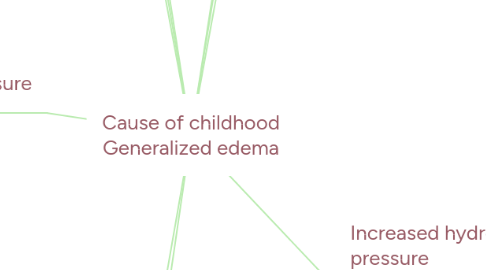
1. New node
2. New node
3. New node
4. Reduce oncotic pressure
4.1. Hypoproteinemic disease
4.1.1. Nephrotic syndrome
4.1.1.1. Primary glomerular lesion
4.1.1.1.1. Minimal change disease
4.1.1.1.2. focal segmental glomerulosclerosis (FSGS)
4.1.1.1.3. Membranous nephropathy
4.1.1.1.4. membranoproliferative glomerulonephritis
4.1.1.1.5. mesangial proliferative glomerulonephritis
4.1.1.2. Systemic cause
4.1.1.2.1. SLE
4.1.1.2.2. IgAV (HSP)
4.1.1.2.3. Infections
4.1.1.2.4. Diabetes
4.1.2. New node
4.1.3. Liver failure
4.1.4. Malnutrition
4.1.4.1. kwashiorkor
4.1.5. New node
4.1.6. New node
4.1.7. Protein losing enteropathy
4.1.7.1. hypertrophic gastritis (Ménétrier disease)
4.1.7.2. milk protein allergy
4.1.7.3. celiac disease
4.1.7.4. inflammatory bowel disease
4.1.7.5. giardiasis
4.1.7.6. intestinal lymphangiectasia
4.1.7.7. right-sided heart dysfunction (post-Fontan procedure
5. Increased capillary permeability
5.1. Severe burns
5.2. Sepsis
5.3. New node
5.4. New node
6. New node
7. New node
8. New node
9. New node
10. Increased hydrostatic pressure
10.1. From sodium and water retention
10.1.1. New node
10.1.2. Cardiovascular disease
10.1.2.1. Heart failure
10.1.2.1.1. Low output heart failure
10.1.2.1.2. High output heart failure
10.1.2.2. Arteriovenous fitsula
10.1.3. Renal cause
10.1.3.1. Acute glomerulonephritis
10.1.3.1.1. Primary AGN
10.1.3.1.2. Systemic AGN
10.1.3.1.3. Post streptococcal glomerulonephritis
10.1.3.2. Acute and chronic renal failure
10.1.3.3. Drug
10.1.3.3.1. Vasodilator
10.1.3.3.2. dihydropyridine calcium channel blockers
10.1.3.4. Nephrotic syndrome
10.1.4. Idiopathic disease
10.1.4.1. Familial idiopathic edema
10.1.4.2. Non-familial idiopathic edema
10.1.4.3. Pregnancy
10.2. Venous obsruction
10.2.1. Hepatic cirrhosis
10.2.1.1. Genetic
10.2.1.1.1. Alpha-1 antitrypsin deficiency
10.2.1.1.2. Cystic fibrosis
10.2.1.1.3. Wilson disease
10.2.1.2. Infectious
10.2.1.2.1. Viral hepatitis
10.2.1.3. Structural problem of biliary tree
10.2.1.3.1. Biliary atresis
10.2.1.3.2. Alagille syndrome
